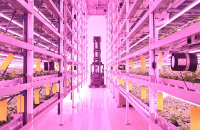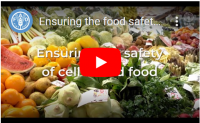News

21/12/2022
With the objective to determine the amount of food allergens that can represent a risk to allergic individuals, the joint ad hoc FAO/WHO Expert Consultation on Risk Assessment of Food Allergens convened the second in a series of meetings on food allergens addressing “How much is too much?”
While some allergic individuals don’t react to low doses of food allergens, others experience tingling or itching sensations and few may even have severe reactions. A worrying one is the rare, but potentially life-threatening anaphylaxis. As part of an ad hoc Joint FAO/WHO Expert Consultation on Risk Assessment of Food Allergens, experts with...

13/12/2022
A recent article written by Keya Mukherjee, FAO Food Safety Specialist, and Vittorio Fattori, FAO Food Safety Officer, made it to the cover of the December 2022/ January 2023 issue of the Food Safety Magazine. The article was based on a publication released earlier in 2022, Thinking about the future of food safety – A foresight report.
The article described the importance of using foresight approaches in global food safety given the myriad challenges that the agrifood systems face today and will continue to in the near future. The areas covered by the article include climate change, new foods...

02/12/2022
This week FAO began a project to improve the food control system in the Seychelles. A 5-million-euro project funded by the European Union, "Strengthening of Capacities and Governance in Food and Phytosanitary Control”, will provide technical support and work with Competent Authorities and other leading institutions in 12 Common Market for Eastern and Southern Africa (COMESA) Member Countries to build up capabilities, strengthen governance and improve strategic planning around two main components: food safety and plant health. As part of the food safety component, an assessment of the national food control system will be carried out in the Seychelles, which...

29/11/2022
FAO has initiated country-level activities, as part of a global 5-million-euro project to improve food safety and phytosanitary control throughout 12 African countries in the Common Market for Eastern and Southern Africa (COMESA) region with training sessions for key participants in the island nation of Comoros.
"Strengthening of Capacities and Governance in Food and Phytosanitary Control,” a two-year project funded by the European Union, is spearheaded by a team of food safety experts from FAO’s Food Systems and Food Safety Division. The team will provide technical support and work with governments to build capacity, strengthen governance and improve the strategic planning...

28/11/2022
Food plays an important role in the spread of antimicrobial resistance (AMR). The presence of AMR microorganisms in the agrifood systems and food chain is a potential route of exposure for everyone. To collect food and agriculture-related AMR data that could help to manage the risks, the...

24/11/2022
FAO and WHO have produced a new series of eLearning courses, which are now available to anyone who wishes to gain a better understanding of the Codex Alimentarius. This collection of food standards, which is fundamental for the safety of food, is set by the Codex Alimentarius Commission as part of the Joint FAO-WHO Food Standards Programme.
The courses are geared to Codex Contact Points, government officials, food producers, consumer representatives, Codex observer organizations and members of the scientific community. They are open access and can also be downloaded. The introductory course is available in English, French and Spanish, and multi-lingual...

23/11/2022
FAO has produced a video to provide an example of how companies use food safety measures to keep their innovative cell-based food safe during production. A number of scientists walk viewers through the different steps in producing steak from cells from a cow in the 20-minute video, called ‘Ensuring the safety of cell-based food’. Also known as cell-cultured or cultivated food, cell-based food involves culturing cells isolated from animals followed by processing to produce food products that are comparable to the corresponding animal versions, such as meat, poultry, seafood, eggs and dairy products.
Masami Takeuchi, FAO Food Safety Officer, explains that...

21/11/2022
Growing interest in healthy diets has led to demand for the year-round availability of fresh fruits and vegetables and need for all actors in the food supply continuum, including in greenhouses, to be aware of the vulnerability of fresh produce to various food safety hazards (biological, chemical and physical).
As part of the project “Smart Farming for Future Generation", funded by the Republic of Korea, FAO provides support to strengthen food safety in greenhouses operations in Viet Nam. In this context, FAO Food Safety Officer Eleonora Dupouy has undertaken a technical backstopping mission in the last week of September 2022 to...

18/11/2022
FAO Farmer Field Schools (FFS) have demonstrated that making changes in livestock production practices can lead to prudent antimicrobial use (AMU), and safe food as well as increased profit margins. Results from pilots in Ghana, Kenya, Zambia, and Zimbabwe show that farmers who participated in FAO’s poultry FFS decreased their use of antimicrobials on the farm and increased their efforts in infection prevention and control. The increased use of biosecurity measures, such as footbaths and personal protective equipment, were a result of improved knowledge, more prudent attitudes and practises on AMU. Increased motivation and interaction with animal health professionals were...

16/11/2022
FAO, with the kind financial support of the Government of France, is currently convening a regional workshop on food safety risk assessment of residues of veterinary drugs in food in Santiago, Chile on 15 - 17 November 2022. The workshop is the result of close collaboration between the FAO Food Systems and Food Safety Division and the FAO Regional Office for Latin America and the Caribbean.
This subject is of great importance for the region, as countries in this area are key producers and exporters of meat. In this regard, FAO’s Food Safety Officer, Vittorio Fattori, pointed out that “it is...
Stay up to date and connect to our RSS feed!
